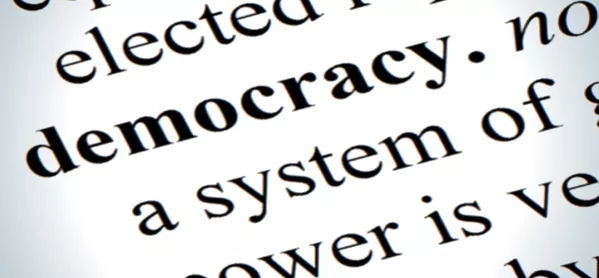England has one of the worst class divides when it comes to young people taking part in political activities at school, according to research published today.
Young people from disadvantaged homes are far less likely to participate in political activities such as student councils and mock elections according to a new book by academics from the University of Roehampton and UCL Institute of Education (IOE).
Citizenship: Restricting climate strikes to one day ‘not acceptable’
Opinion: ‘Rethinking citizenship is vital in the age of Brexit’
Background: Citizenship education in a ‘parlous state’
In addition, they feel less confident in contributing to open discussion than their middle-class peers.
The research found that working-class young people in various countries have lower levels of participation in aspects of the democratic process, such as voting and joining political parties, but they found that the class gap is especially pronounced in England.
In their book - Education, Democracy and Inequality: Political Engagement and Citizenship Education in Europe - researchers Professor Bryony Hoskins, of the University of Roehampton, and Dr Jan Germen Janmaat, of UCL Institute of Education, found that social class was more strongly associated with whether people voted in the UK than in other countries.
Moreover, they suggested a class gap in English pupils’ political participation was being exacerbated by the school system.
While their analysis found there was no significant difference in access to citizenship teaching by background, as this had been part of the UK national curriculum since 2002, pupils from disadvantaged backgrounds were less likely to participate in political activities at school.
Their research found that:
- 62 per cent of pupils in England who had more than 200 books at home said they had voted in student council elections, while only 30 per cent of children with fewer than 10 books at home had done so.
- Six per cent of children whose parents had left school at 16 had taken part in mock elections within the past year. But the figure was double that - 12 per cent - among those whose parents had degrees.
- Children of parents with university degrees were 50 per cent more likely to take part in political activities at school than those whose parents left school at 16, and 40 per cent more likely to do so than those whose parents left school at 18.
“Our analyses revealed disadvantaged youth to have significantly less access to these highly important ways of learning political engagement compared to their more advantaged peers,” Professor Hoskins and Dr Janmaat said.
Their analysis of six European countries found that England had a greater divide in political participation in school by social background than Sweden, Switzerland, Ireland, Poland and Italy.
“The English education system is providing the most unequal access to learning political engagement across Europe,” the book concludes.
They suggested that this might be caused by schools serving disadvantaged communities only focusing on the “basics” of literacy and numeracy.
And they said these schools focused on managing tight discipline rather than aiming to foster an open culture of debate. They said that while these practices might boost exam results, it did not prepare pupils to take part in democratic processes.
Dr Janmaat said: “By focusing on the ‘basics’ of education in this way, schools serving disadvantaged communities are missing out on chances to help their pupils become more politically engaged.
“The backgrounds of such pupils make them less likely to be politically engaged in any case. So these educational policies are likely only to be widening the engagement gap between working-class children and those from middle-class backgrounds.”
Furthermore, the researchers suggested that at an international level, this class divide could be driving the rise of populism, from the election of US president Donald Trump to Brexit.




